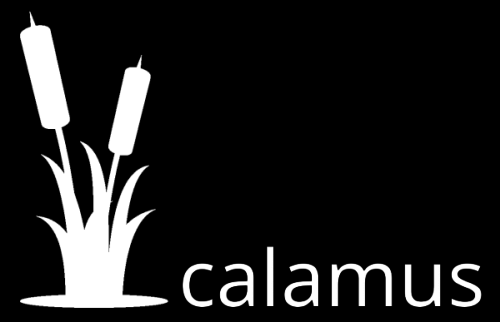calamus is a library built on top of marshmallow to allow (de-)Serialization of Python classes to JSON-LD.
Project description

calamus: JSON-LD Serialization Library for Python



calamus is a library built on top of marshmallow to allow (de-)Serialization of Python classes to JSON-LD
Installation
calamus releases and development versions are available from PyPI. You can install it using any tool that knows how to handle PyPI packages.
With pip:
$ pip install calamus
Usage
Assuming you have a class like
class Book:
def __init__(self, _id, name):
self._id = _id
self.name = nameDeclare schemes
You can declare a schema for serialization like
from calamus import fields
from calamus.schema import JsonLDSchema
schema = fields.Namespace("http://schema.org/")
class BookSchema(JsonLDSchema):
_id = fields.Id()
name = fields.String(schema.name)
class Meta:
rdf_type = schema.Book
model = BookThe fields.Namespace class represents an ontology namespace.
Make sure to set rdf_type to the RDF triple type you want get and model to the python class this schema applies to.
Serializing objects (“Dumping”)
You can now easily serialize python classes to JSON-LD
book = Book(_id="http://example.com/books/1", name="Ilias")
jsonld_dict = BookSchema().dump(book)
#{
# "@id": "http://example.com/books/1",
# "@type": "http://schema.org/Book",
# "http://schema.org/name": "Ilias",
#}
jsonld_string = BookSchema().dumps(book)
#'{"@id": "http://example.com/books/1", "http://schema.org/name": "Ilias", "@type": "http://schema.org/Book"}')Deserializing objects (“Loading”)
You can also easily deserialize JSON-LD to python objects
data = {
"@id": "http://example.com/books/1",
"@type": "http://schema.org/Book",
"http://schema.org/name": "Ilias",
}
book = BookSchema().load(data)
#<Book(_id="http://example.com/books/1", name="Ilias")>Validation of properties in a namespace using an OWL ontology
You can validate properties in a python class during serialization using an OWL ontology. The ontology used in the example below doesn’t have publishedYear defined as a property.
class Book:
def __init__(self, _id, name, author, publishedYear):
self._id = _id
self.name = name
self.author = author
self.publishedYear = publishedYear
class BookSchema(JsonLDSchema):
_id = fields.Id()
name = fields.String(schema.name)
author = fields.String(schema.author)
publishedYear = fields.Integer(schema.publishedYear)
class Meta:
rdf_type = schema.Book
model = Book
book = Book(id="http://example.com/books/2", name="Outliers", author="Malcolm Gladwell", publishedYear=2008)
data = {
"@id": "http://example.com/books/3",
"@type": "http://schema.org/Book",
"http://schema.org/name" : "Harry Potter & The Prisoner of Azkaban",
"http://schema.org/author" : "J. K. Rowling",
"http://schema.org/publishedYear" : 1999
}
valid_invalid_dict = BookSchema().validate_properties(
data,
"tests/fixtures/book_ontology.owl"
)
# The ontology doesn't have a publishedYear property
# {'valid': {'http://schema.org/author', 'http://schema.org/name'}, 'invalid': {'http://schema.org/publishedYear'}}
validated_json = BookSchema().validate_properties(book, "tests/fixtures/book_ontology.owl", return_valid_data=True)
#{'@id': 'http://example.com/books/2', '@type': ['http://schema.org/Book'], 'http://schema.org/name': 'Outliers', 'http://schema.org/author': 'Malcolm Gladwell'}
You can also use this during deserialization.
class Book:
def __init__(self, _id, name, author):
self._id = _id
self.name = name
self.author = author
schema = fields.Namespace("http://schema.org/")
class BookSchema(JsonLDSchema):
_id = fields.Id()
name = fields.String(schema.name)
author = fields.String(schema.author)
class Meta:
rdf_type = schema.Book
model = Book
data = {
"@id": "http://example.com/books/1",
"@type": "http://schema.org/Book",
"http://schema.org/name": "Harry Potter & The Chamber of Secrets",
"http://schema.org/author": "J. K. Rowling",
"http://schema.org/publishedYear": 1998,
}
verified_data = BookSchema().validate_properties(data, "tests/fixtures/book_ontology.owl", return_valid_data=True)
book_verified = BookSchema().load(verified_data)
#<Book(_id="http://example.com/books/1", name="Harry Potter & The Chamber of Secrets", author="J. K. Rowling")>
The function validate_properties has 3 arguments: data, ontology and return_valid_data.
data can be a Json-LD, a python object of the schema’s model class, or a list of either of those.
ontology is a string pointing to the OWL ontology’s location (path or URI).
return_valid_data is an optional argument with the default value False. Default behavior is to return dictionary with valid and invalid properties. Setting this to True returns the JSON-LD with only validated properties.
Annotations
Classes can also be annotated directly with schema information, removing the need to have a separate schema. This can be done by setting the metaclass of the model to JsonLDAnnotation.
import datetime.datetime as dt
from calamus import JsonLDAnnotation
import calamus.fields as fields
schema = fields.Namespace("http://schema.org/")
class User(metaclass=JsonLDAnnotation):
_id = fields.Id()
birth_date = fields.Date(schema.birthDate, default=dt.now)
name = fields.String(schema.name, default=lambda: "John")
class Meta:
rdf_type = schema.Person
user = User()
# dumping
User.schema().dump(user)
# or
user.dump()
# loading
u = User.schema().load({"_id": "http://example.com/user/1", "name": "Bill", "birth_date": "1970-01-01 00:00"})Support
You can reach us on our Gitter Channel.
Project details
Release history Release notifications | RSS feed
Download files
Download the file for your platform. If you're not sure which to choose, learn more about installing packages.
Source Distribution
Built Distribution
File details
Details for the file calamus-0.3.7.tar.gz.
File metadata
- Download URL: calamus-0.3.7.tar.gz
- Upload date:
- Size: 21.0 kB
- Tags: Source
- Uploaded using Trusted Publishing? No
- Uploaded via: poetry/1.1.4 CPython/3.7.9 Darwin/19.6.0
File hashes
| Algorithm | Hash digest | |
|---|---|---|
| SHA256 | 981db6ecd8483c48725bf505c1164d5a531b698c78b14b9e9e8be693f6c9d63f |
|
| MD5 | 2766e2e31172bc8bbcbd3efc4112191c |
|
| BLAKE2b-256 | 6b880e4c44f48ba9e3a0b07ec330be74fe0ba87a9ac7413c00d34327f9ec114b |
File details
Details for the file calamus-0.3.7-py3-none-any.whl.
File metadata
- Download URL: calamus-0.3.7-py3-none-any.whl
- Upload date:
- Size: 21.7 kB
- Tags: Python 3
- Uploaded using Trusted Publishing? No
- Uploaded via: poetry/1.1.4 CPython/3.7.9 Darwin/19.6.0
File hashes
| Algorithm | Hash digest | |
|---|---|---|
| SHA256 | 5311c5c1769d16f46a4270e68a72147f6141fe8b3a1e10c718ac9559925b6624 |
|
| MD5 | d37bc67ebbd644ace0321019c333bb86 |
|
| BLAKE2b-256 | 3b299385ddbce20c043666ed15de115c57826d7f7b2c7d48957adf92f093941e |














